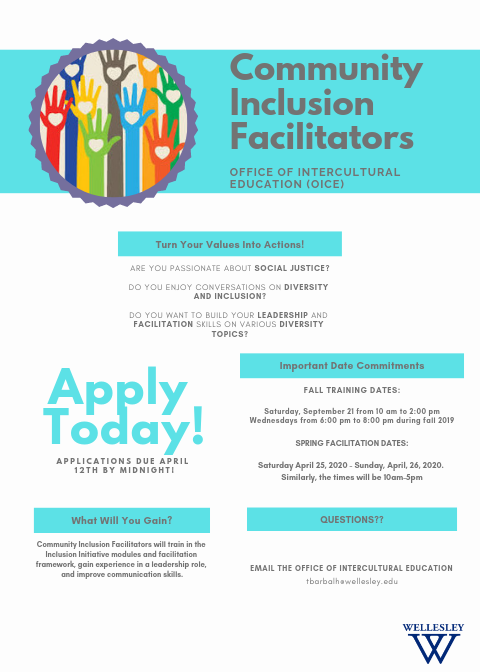The Office of Intercultural Education has announced to College Government a new initiative seeking to broaden inclusivity and openness about sociocultural topics. Dean Ines Maturana Sendoya told senate on April 8 about the Office’s plan to implement this initiative next year.
The Inclusive Initiative is a new measure to combat the lack of intercultural dialogue on campus. Spearheaded by Dean Maturana Sendoya, the initiative will seek to catalyze conversations for students to engage in cross-cultural dialogue.
The initiative stems from several listening sessions held by Dean Maturana Sendoya during Fall 2018. The listening sessions were organized with faculty, students and staff as well as student organizations on-campus. Her purpose was to learn as much about campus environment surrounding intercultural dialogue and how students and faculty went about engaging in it. During the listening sessions, Dean Maturana Sendoya asked her audience three specific questions: What is the first word that comes in your mind when you think of inclusion? What are the things that we do well (in terms of facilitating inclusive intercultural dialogue)? What are your hopes and dreams in the future? According to Dean Maturana Sendoya, “During that period, I learned of the interest in the community to have more opportunity to engage in cross-cultural dialogues, and to discuss social justice topics. This initiative is a direct response to those hopes and dreams.”
Dean Maturana Sendoya collaborated with other committees on campus to appeal broadly to implementation and support for this initiative. She worked with groups such as the Committee on Ethnicity, Race and Equality (CERE) and the College Task Force on Speech and Inclusion. These discussions and collaborations revealed the need for students to come together, despite cultural differences; the need for more extensive conversations about sociocultural subjects such as access, power and privilege; for more safe spaces and administrative help for LGBTQ+ community and lastly, the need for more multicultural academic programs and disciplines. The Initiative design was laid out in association with Slate International Center, as well as with consultation with outside sources to design a curriculum based on this feedback.
The Initiative will revolve primarily around the selection of a few students as the Community Inclusion Facilitators. The Office of Intercultural Education sent a college-wide mass email informing students about the position of Community Inclusion Facilitator with an attached application. The Community Inclusion Facilitators will be trained to handle discussions surrounding intercultural and sociocultural dialogue, while also creating environments for the catalysis of these conversations among students.
The Community Inclusion Facilitators will be trained using a specialized model with eight modules, accumulating into 20 hours of training during the fall semester. The modules will specialize in initiating discussion on several topics: Oppression, Privilege and Microaggressions, Racism and Whiteness, exploring Class, Socioeconomic Status, and the Impact of Money; Identities of Gender and Sexual Orientation; Disability/Ability, and Putting it all Together: From Awareness to Allyship to Accomplice. The criteria for selecting students for the position of Community Inclusion Facilitator revolves around their commitment and passion for social justice so that they are well-versed in immersing themselves into the intense training as well as implementing it around campus.
The Office of Cultural Education hopes to use the facilitators as a foundation for training RA (Residential Assistants) in the year 2019-2020 in collaboration with the Office of Residential Life. The Facilitators will assist with RA training in order to improve upon the conflict resolution training of RAs. Currently, RA training includes some aspects of the training modules but it sidesteps from involving discussions about microaggressions, socioeconomic status, gender and sexual orientation and oppression. This training program will focus more on intercultural dialogue, an aspect currently not severely emphasized in the current RA training schedule, as well as how to transition into conflict resolution from that.
While describing the effects she hopes to produce through the initiative, Dean Maturana Sendoya said, “My hope is that the initiative will help students build their intercultural competency as they learn from each others’ experiences and have the opportunity to expand their knowledge about issues of class, race, disability/ability, sexual orientation, etc. I also hope that as students build their skills around difficult conversations and become more comfortable interacting directly with each other around these topics that it will reduce the need to engage in anonymous platforms, which is detrimental to creating a healthy and inclusive climate on campus.”






